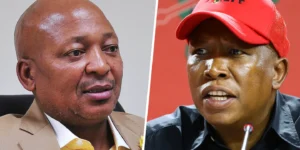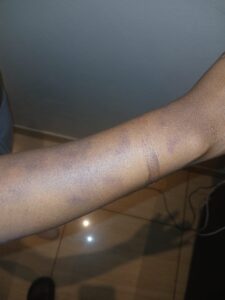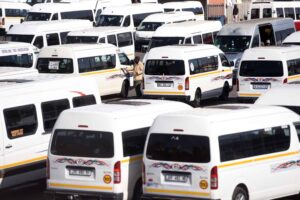By: Clyde Ramalaine
[This musing makes up a two-part series. In this first instalment we attempt engaging the notion of a securocratic State to ask are we seeing signs of it in SA. In in the second instalment, we engage the identifiers of early signs of dictatorship]
On Thursday night, President Cyril Ramaphosa finally reshuffled or, as he says, reconfigured his national executive team. What ought to be a reshuffle to optimise functionality and service-delivery Ramaphosa made peculiar changes in 10 portfolios. These changes, in a sense, can be understood as recycling of and rewarding more CR17/22 supporters, more patronage. This musing, however, does not deal with the personalities and positions but attempts to look at a particular and very peculiar choice Ramaphosa made. He announced that the political responsibility for the State Security Agency would now be located in the office of the Presidency as led by Deputy Minister Zizi Kodwa. In the aftermath of the reshuffle, we heard Acting DSG Jessie Duarte lamenting there was no consultation of the National Office Bearers by Ramaphosa. NEC Member and Transport Minister Fikile Mbalula accused the DSG of being a liar.
At a political level, Ramaphosa’s choice for Kodwa confirms that he supports the questionable intelligence report that explains the recent unrests in frames of a ‘coup’, ‘insurrection’, ‘sabotage’ aimed at toppling his Presidency. South Africa heard Ramaphosa explain his rationale for relocating the SSA directly in the Presidency with the following words: “This is also done by a number of other governments around the world.” He went on to say, “This is to ensure that the country’s domestic and foreign intelligence services more effectively enable the President to exercise his responsibility to safeguard the security and integrity of the nation”. With this, Ramaphosa justified his decision.
The President’s decision to label the violent expression of the anger, frustration and desperation by the poor an “insurrection”, is based on the decision of a factional and weak leader to play the politics of scapegoating, to tarnish his political and ideological opponents as “insurrectionists” and “vigilantes” so that instead of engaging them on the democratic political playing field, he can use the state intelligence and security apparatuses to “criminalize” their opposition to them, and then to use state agencies (i.e. the State Security, NPA, SAPS and biased, bought, judiciary) to suppress, arrest and imprison them.
Ramaphosa’s logic for moving the SSA raises more questions than answers for a democratic state. If the President, in his articulated objectives for the moving of SSA, is sincere, is there a need for a cabinet? Why not collapse the portfolios as all reporting under the Presidency, if such ‘effectively enables the President to exercise his responsibility to safeguard the integrity” of the treasury, education, healthcare, social services or any other in a democratic state is to deliver for its citizens? This unilateral decision is naturally the antithesis of democracy, which dictates intelligence entities for how it operates in information solicitation. Yet his decision takes place, not in a vacuum. In the immediate aftermath of the recent unrests, all communications on the unrests were unilaterally handled by the Presidency. Some may welcome this to conclude that had the president in the instance of the recent unrest had access to the information timeously he would have been able to act to deploy the police. This argument conveniently does not deal with the fact that the president equally so may interfere and repurpose the intelligence for his narrow political ends.
We are told, a securocratic state is one in which the military-security apparatus is a dominant factor in the power complex that is the State. Meaning securocracy is the very antithesis of democracy. In the aftermath of the unrest, we saw the SA president flanked by the heads of the SANDF and SAPS, respectively. An important and unique moment in democratic SA since no president from Mandela ever addressed SA flanked by the leaders of SANDF and SAPS. Perhaps the President may personally have felt safer flanked by the SANDF and SAPS. On another score, we may surmise Ramaphosa wanted to show he is in charge, not forgetting he twice reminded SA, or maybe himself, that he is the “Commander in Charge”. From this assumption, we may deduce a play on power demonstrated by the President to his political foes within the ANC.
We are still not sure what their respective presence symbolised on the night when the President on July 16 addressed the nation. The President never explained his action in this regard. In the absence of him describing himself, we are left to conclude a litany of things. I have elsewhere cautioned against the overreliance of police and soldiers by democratic leaders since these usually detail a lack of genuine leadership hence a need to threaten with brute force. The absorption of the intelligence into the Presidency must be understood against this show of apparent military and police power by the Ramaphosa.
On the same night, Ramaphosa spoke of a state of emergency when there was no need for such since it entered our discourse by an eNCA anchor who clearly never understood what it was to have lived under Apartheid through that. The PW Botha apartheid regime never hesitated to unleash the SADF and its Police dogs on those it denied equal humanity. During Apartheid, we lived under a securocratic state. Increasingly in misuse of COVID 19 pandemic claims with its unscientific regulations, we are evidencing a State that slides into this securocracy under the leadership of Ramaphosa. Naturally, we will hear from the President that this is done in the protection of democracy. However, this is an assault on the fruit of democracy and erodes the fabric of our hard-fought liberties.
Beware those who will tell you they accommodate and support this because it’s in defence of the constitution. The presence of SANDF in our society is and will never be normal or welcomed as correct. Soldiers were never trained to police their citizens but to engage in external threats to the sovereignty of a State. One can argue that it aids the subculture of violence and damages the innocence of children and civilians at a psychological level. Releasing the army as a first and last resort attest to society in leadership wholly bankrupt to engage the challenges in the calmness of mind. Resorting to the military to fix political stalemates and indifferences is to misappropriate the leadership in democracy demands. Citizens were never meant to be exposed to the defence force’s machinery, weaponry and equipment in their local townships.
Apartheid’s dogs of war against its citizens targeted Apartheid racialised townships. They bulldozed and ransacked out of the brutality of the superior ideology in which black people were designated a subhuman life. Today Ramaphosa’s soldiers and police ransack the same townships that Apartheid bequeathed and the ANC-led government eternalised as the past, present and future of black life. In search of maise-meal, sugar and washing powder. They invade black homes and shacks with apartheid disrespect, which will never happen to any white home.
The 2021 South African securocratic State is wholly centred in the interest of a CR22 second term. A presidency obsessed to rely on apparent intelligence reports often informed by ANC factional origin to deal with internal political opposition. It is a State high on the steroids of its leader’s insecurity, paranoia and fear, warning that ‘instigators’ are plotting to topple him and sits behind the unrests. It is also a state that leans on the notion of a common-enemy-complex-phenomenon as its means for existence. Having lived through this under PW Botha, South Africans daily realise the democratic in strange ways mirroring historical apartheid. Do we still live in a democracy is what we increasingly ask.

A Lifelong Social Justice Activist Political Commentator & Writer is a SARChi D. Litt.et. Phil candidate in Political Science with the University of Johannesburg. Chairperson of TMoSA Foundation – The Thinking Masses of SA






